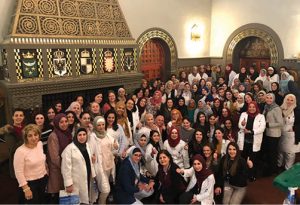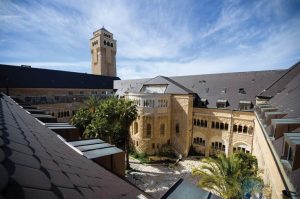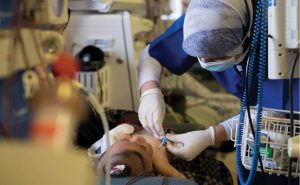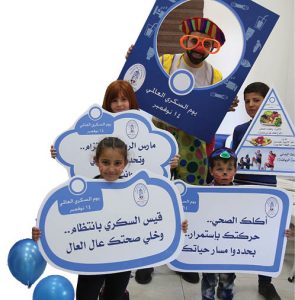Located in the heart of Al-Quds/Jerusalem, at the top of the Mount of Olives, Augusta Victoria Hospital (AVH) is a program of the Lutheran World Federation (LWF) Department for World Service. It was established in partnership with the United Nations Relief and Works Agency for Palestine Refugees in the Near East (UNRWA) as a major medical facility to care for Palestinian refugees of the year 1948.
Over the years it has developed some cutting-edge technologies and capacity for the treatment of tumors and cancer, including hemato-oncology, utilizing radiation therapy, advanced hormonal and chemotherapy, bone marrow transplantation, and most recently, it has acquired the nuclear medicine scanner, the PET−CT. Not only does the hospital offer medical services, it also exerts great efforts in developing a Palestinian health system centered on the patient in a comprehensive and intensive manner.

The event included a lunch party and gifts distribution for all AVH female staff.
After AVH had served for many years as a secondary care hospital, the late Dr. Tawfiq Nasser, who was appointed in 1997 as AVH chief executive officer, had a vision and worked with the governance of AVH, including senior LWF management in Geneva, to transform the hospital into what it has become today, a tertiary health care medical center with the motto: Serious Medicine, Caring Staff. Since then, it has developed into a major player on the national health care scene, with several specialties that are unavailable within the Palestinian health care system.

Licensed for 171 beds, AVH is the second-largest hospital in East Jerusalem. The majority of its clientele are referred by the Palestinian Ministry of Health. In 2018, more than 450 employees worked day and night to provide unprecedented medical services with the highest international health standards. It is worth mentioning that AVH has received ISO certification and is the first hospital in East Jerusalem and the Palestinian territories to be accredited by the Joint Commission International (JCI) for the quality of services it provides and the safety of patients. Moreover, in October 2018, AVH won first place in the Distinguished Institutions category of the Palestine International Award for Excellence and Creativity, awarded by the Paltel Group Foundation.
Currently AVH is the leading health care facility for the care of patients with cancer within the Palestinian territories, targeting the West Bank, the Gaza Strip, and East Jerusalem.
AVH is the sole specialized-care hospital in the West Bank and Gaza for oncology and the leader in cancer care in the Palestinian territories, providing the full range of treatment, including surgery, radiation therapy, and chemotherapy. The Medical Oncology Unit started in 2002, and the Radiation and Surgical Oncology units in 2005. It is the only facility in the Palestinian territories with medical linear accelerators for radiation treatment, and it has established a pediatric oncology unit to treat the huge number of children with cancer who are referred annually to AVH.
Because the AVH Cancer Center has been operational for many years, it has now acquired an experienced team of oncologists, physicians, medical biophysicists, radiation therapists, oncology nurses, and other personnel. AVH was the first hospital to be approved for a radiation oncology residency training program by the Palestinian Medical Council. The hospital also has a training program in medical oncology and is recruiting physics majors from local universities to train in the subspecialty of medical biophysics. Oncology nursing and palliative nursing are other areas of focus for the training programs at AVH. This core of skilled individuals provides a strong base on which to build further training capacity, particularly for prevention, early detection, and psychosocial care of cancer patients.
In line with the hospital’s overall strategy to establish health services otherwise unavailable to the Palestinian community, AVH has recently procured the first PET-CT scanner in East Jerusalem. Moreover, it has managed to acquire two additional advanced linear accelerators to accommodate the increasing number of cancer patients. This represents a unique service within the Palestinian territory and serves more than five million Palestinians.
In order to complete the continuum of care, the hospital also adopted a strategy to reach the local community through community programs, including the Mammography and Diabetes Mobile Clinic. Currently the hospital runs the following care centers:
- Cancer Care Center: radiation oncology, medical oncology, mobile breast cancer screening program
- Skilled Nursing and Long-Term Care Center: subacute care, geriatric care, pain control, and palliative care
- Diabetes Care Center: specialized clinical practice, nutrition and dietetics, foot care, eye screening, and outreach community-based mobile clinic
Surgical and ENT Care Center - Specialized Child Care Center: pediatric hemato-oncology and pediatric kidney dialysis
- Clinical Support Care Center: intensive care unit, operating rooms, anesthesia, medical diagnostic laboratory, and diagnostic and therapeutic radiology
- Kidney Care Center: adult dialysis unit
- Hematology and Bone Marrow Transplantation Center
AVH provides special characterized services in a comprehensive manner that incorporates the WHO definition of health as attending to the overall needs of the community it serves, including psychosocial, recreational-educational, medical aspects, and others. For example, AVH works to provide accommodation, meals, and transportation to patients who come from the Gaza Strip as it aims to provide their services in a dignified manner to patients and their families.

Moreover, AVH has established, in cooperation with the Palestinian Ministry of Education, the first school of its kind in Palestine (Persistence School) to provide continuing education for children with chronic illnesses and who otherwise are unable to attend regular schools. This year we have 45 patients from primary to high school. The school helps to ensure that young patients who come to AVH will be able to continue with their studies despite prolonged and intensive treatment.

AVH now focuses much of its strategic efforts on cancer and palliative care. To this end, the hospital will build a 144-bed cancer and palliative center next to the current AVH building that will aim to strengthen and sustain resilient Palestinian institutions in East Jerusalem, respond to the unfulfilled needs of cancer patients and the elderly population, provide employment, and be a model for good governance.
For contributions and support, please contact us at info@avh.org.



